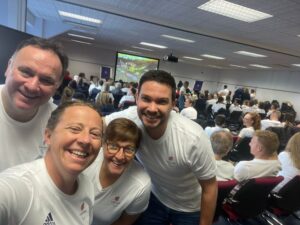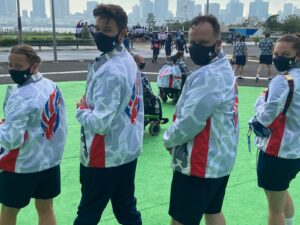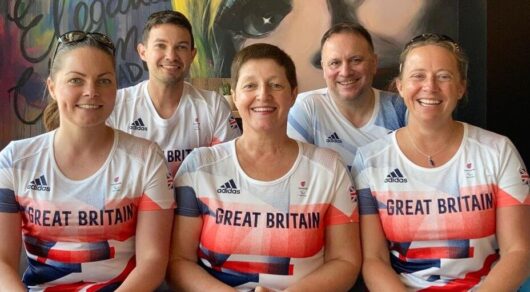A nurse heading to the Paralympic Games in Paris to support participating athletes this summer has spoken exclusively about her unique and rewarding role.
Kim Brinkworth, an NHS ward manager, told Nursing in Practice it was her managerial experience, alongside years of clinical training, that had prepared her so well for the games.
The Paris competition will be Ms Brinkworth’s fifth experience of the games, having supported team GB at Beijing in 2007 and first working as lead nurse at Rio de Janeiro in 2016.
She is heading a team of four nurses and a nurse practitioner, supporting ParalympicsGB athletes’ medical needs throughout 12 days of international sporting events this summer.
‘The basic skills of nursing are the same wherever you are, but I find that in a sporting environment there is a lot more autonomy, you haven’t got the same level of clinical support network as you would in a hospital environment,’ she explained.
‘I find having the sporting side to my nursing just keeps me enthusiastic, it’s a different pathway that I enjoy doing, being out of the hospital environment and using my nursing skills.
‘Being able to support someone in a new environment is really quite rewarding, and it makes me a more interesting nurse.’
She added that working alongside colleagues with diverse specialisms gives her the chance to refine skills she doesn’t use in her everyday work.
The nursing team has been reworked from previous years, with a reduced number of healthcare staff to account for the nearby location of Paris and the reduced impact of Covid-19.
The group includes a clinical nurse lead, a clinical nurse specialist, a critical care technologist and an advanced clinical practitioner, who will be working alongside Ms Brinkworth.
Speaking to Nursing in Practice Ms Brinkworth said: ‘Having such a broad group of nurses is great as it really brings out a good mix, especially because we never know what’s going to come about.
‘A lot of our competitors within Paralympics do have underlying medical conditions and there’s always the unknown when you’re in a different environment, working at high intensity where there’s the risk of injury.
‘So, I think having that understanding and being able to share the knowledge you take from home with the team is really important.’
Ms Brinkworth has spent the last 20 years working in the in the NHS, most recently as a ward manager at Queen Victoria Hospital NHS Foundation Trust in West Sussex.
She currently oversees over 40 beds in the hospital’s acute plastics and reconstructive surgical ward, specialising in reconstructive care for patients following skin, breast, and neck cancer treatment, alongside traumas of the eye, hand and lower limb.
All ParalympicsGB staff receive additional training ahead of the games, to ensure every team member is up to date with the range of clinical skills required to work with patients presenting needs that staff may not treat in their everyday roles.
As Brinkworth explained: ‘I wouldn’t usually work with people with spinal cord injuries in my everyday work, but there’s a higher number of them within the Paralympic environment and just keeping those skills up to date and being aware of them is really rewarding.’
The nursing team works closely with ParalympicsGB to ensure the sports village staff have all the training and healthcare equipment ahead of the games, organising direct communication with healthcare and non-healthcare staff ahead of the games.
The nurses also provide additional training for specialist sports medicine doctors, with nurses working one on one with a doctor in the busy camp environment.
‘Some staff don’t necessarily have the more basic skills like catheterisation, especially as they’ve never had to do it,’ Ms Brinkworth explained.
‘It’s daunting for them if they’re in a new environment when they’re faced with having to do a catheter or to manage a catheter, so being able to share the necessary skills and information is a massive thing ahead of the games.’
Ms Brinkworth first got involved in sports nursing whilst working at a defence medical rehabilitation centre from 2003 to 2013.
Her role focused on rehabilitating soldiers who had received serious physical and traumatic injury during wars in Iraq and Iran.
‘We had to manage not only the nursing side of care but also the physical and emotional side. We were having to provide people with activities to keep them engaged in life,’ she said.
Ms Brinkworth turned to sport as an activity to uplift patients, working to strengthen their physical and mental health following periods of significant trauma.
‘We could get these individuals engaging again, they were exercising, they were motivated, and they were enjoying it. And for me, that brought a spark,’ she recalled.
Looking ahead Ms Brinkworth admitted that this may be her final games but said ‘you can never say never’ and that the pull of the Paralympics could draw her back in four years’ time.
‘You’re in an environment that is not replicated anywhere else, you’re in an environment that has literally got hundreds, if not thousands of individuals with a diversity of needs, physically, mentally, and culturally.
‘Being immersed in that environment is really something special and gives you a whole new viewpoint on life,’ she said.








